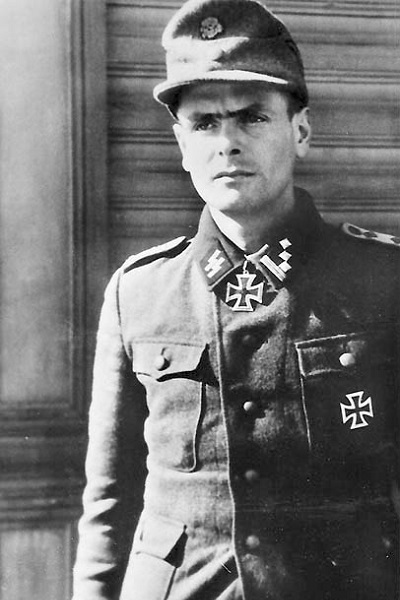Rühle von Lilienstern, Hans Joachim (Waffen SS)
- Date of birth:
- January 9th, 1915 (Fritzlar/Hesse, Germany)
- Date of death:
- November 26th, 2000 (Frankfurt am Main/Hesse, Germany)
- Service number:
- SS-Nr.: 151.372 // NSDAP-Nr.: 3.287.913
- Nationality:
- German
Biography
Rühle von Lilienstern was born in Fritzlar, Hesse, in 1915, the son of a doctor. At the beginning of January 1933, before the National Socialists came to power, he joined the National Socialist German Workers' Party (NSDAP) and the SS. He was employed as a trainer in the 1. SS-Standarte; between 1934 and 1935 he did military service in the Reichswehr, most recently as a sergeant in a rifle unit. In 1938 he was promoted to lieutenant in the reserve. During this time he worked in the chemical industry.
He started studying in Munich in 1934 and graduated in 1938 with a degree in economics. After the beginning of the Second World War he took part in the French campaign as a member of the Waffen SS. At the beginning of the German-Soviet War he was in command of the war correspondent platoon of the SS-Totenkopf-Division. From 1942 he was employed in the Aryanization department of the Reich Commissioner of the Netherlands. There he was involved in the confiscation of Jewish property and their expropriation. Promoted with a doctorate, he used these processes as main topic of his thesis. Later Rühle von Lilienstern was a front-line officer of the I./ 48. SS-Freiwilligen-Panzergrenadier-Brigade „Nederland" on the Eastern Front and received the Knight's Cross of the Iron Cross in January 1944. He was then assigned to head the SS Junker-Schule in Bad Tölz. At the end of the war he commanded a battalion of the 38. SS-Grenadier-Division „Nibelungen".
After the end of the war, Rühle von Lilienstern was employed as an honorary professor at the Technical University of Stuttgart. Furthermore, he was a business advisor and managing director of the Rationalization Board of Trustees of German Business in Frankfurt. In 1973, a revocation of his doctorate from 1942 was discussed after the journalist Julius Mader noticed the anti-Semitic and pseudoscientific tone of the doctoral thesis of 1942. However, the academic degree was not withdrawn. Rühle von Lilienstern died in 2000.
Promotions:
SS-Ustuf: 30.01.1938;
SS-Ostuf: 09.11.1940;
SS-Hstuf.d.R.: 09.11.1942;
SS-Stubaf: 01.09.1944.
Do you have more information about this person? Inform us!
- Period:
- Second World War (1939-1945)
- Awarded on:
- November 9th, 1940
- Period:
- Second World War (1939-1945)
- Period:
- Second World War (1939-1945)
- Period:
- Second World War (1939-1945)
- Awarded on:
- 1942
- Period:
- Second World War (1939-1945)
- Awarded on:
- January 22nd, 1944
- Period:
- Second World War (1939-1945)
- Rank:
- SS-Hauptsturmführer der Reserve (Captain of Reserves)
- Unit:
- Führer, I. Bataillon, niederländische SS-Freiwilligen-Panzergrenadier-Regiment 48 "General Seyffardt", 23. SS-Freiwilligen-Panzergrenadier-Division "Nederland"
- Awarded on:
- February 12th, 1944
“On the 20.01.1944 strong enemy forces threatened the newly erected battle line in the sector Witino—Gluchowo (located on both sides of the Narva—Leningrad highway). SS-Hauptsturmführer Rühle von Lilienstern and his Bataillon-Kampfgruppe Nederland were tasked with standing by in the Witino area as a ready reserve.
However by the time the lead elements of the Kampfgruppe arrived the enemy had already penetrated into Witino in significant strength. Acting on his own initiative, SS-Hauptsturmführer Rühle von Lilienstern immediately ordered his men to dismount their vehicles and begin an immediate counterthrust. The enemy were thrown back with bloody losses, and the existing frontline gap was closed.
The Kampfgruppe then proceeded to hold the village for 3 days despite sustaining heavy losses of its own. In particular, it managed to repulse 10 regimental-strength enemy attacks within the span of just a single night (the 22./23.01.1944). Throughout this time the Kampfgruppe commander personally led 17 counterthrusts with his messengers plus any other elements he could find in order to eliminate enemy penetrations in both his sector as well as those on the left and right. These in turn cost the enemy heavy losses.
The exemplary conduct of SS-Hauptsturmführer Rühle von Lilienstern was crucial for the realization of these successes. He was always present at the hotspots of his sector, and his men were inspired to their highest level of resistance through his example.
Although he became wounded himself, he continued to lead his Kampfgruppe and decisively delayed the advance of overwhelming enemy forces by fulfilling his mission. Now, after 6 days of unending battle operations with constant attacks from both the front and flanks, Kampfgruppe Rühle continues to be the bulwark along the Leningrad—Narva highway. The self-sacrifice of this unit is preventing the Korps front from disintegrating along both sides of the highway, and in doing so it is providing decisive help in enabling the creation of a new frontline.”
Sources
- Photo 1: Igor Poul
- Photo: SS-Hauptsturmführer Hans Joachim Rühle von Lilienstern - Axis History Forum
- - MOONEY, PETER, Waffen-SS Knights and their Battles, Schiffer Military History, 2016.
- Fellgiebel W.P., Elite of the Third Reich, The recipients of the Knight's Cross of the Iron Cross 1939-1945: A Reference, Helion & Company Limited, Solihull, 2003, ISBN 1-874622-46-9
- Nordmenn i Waffen-SS 1941-1945
- Microfilm Publication A3343. US National Archives














